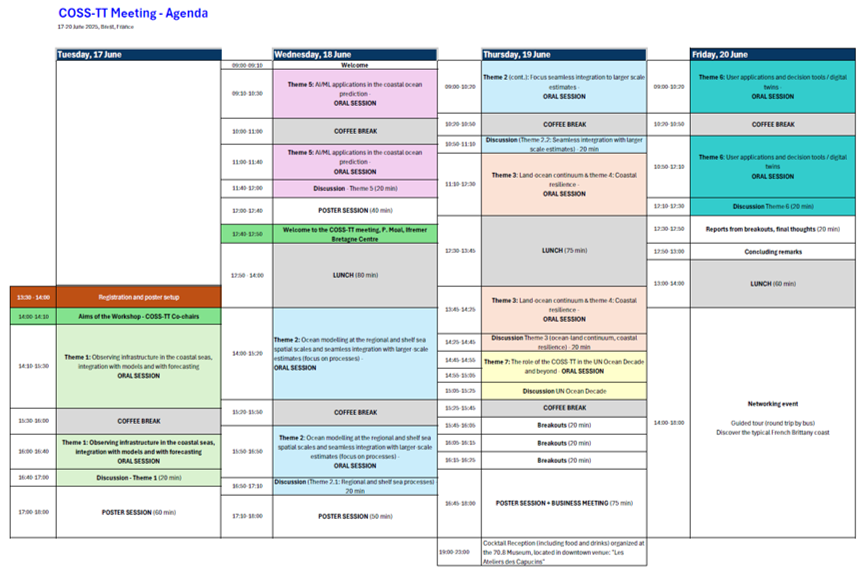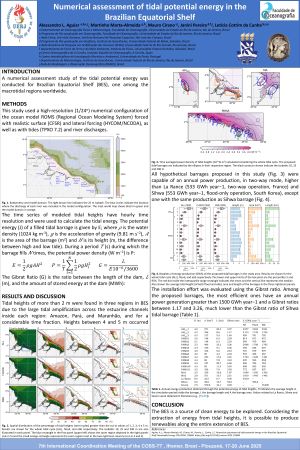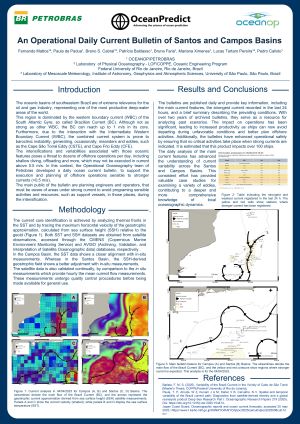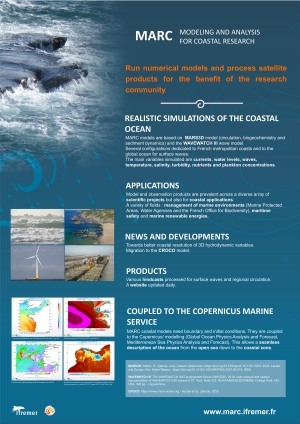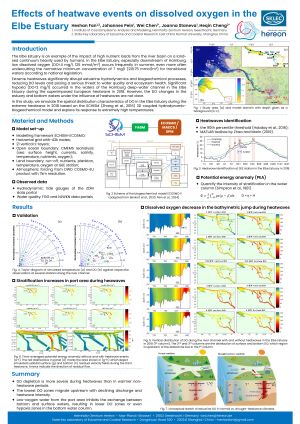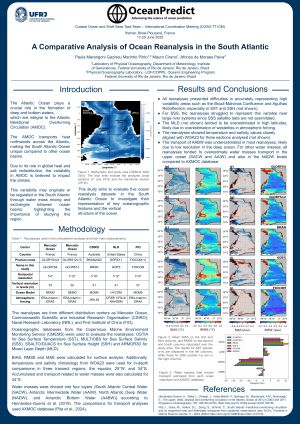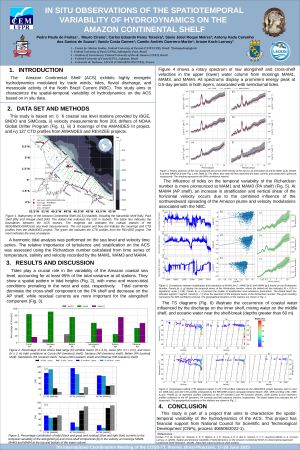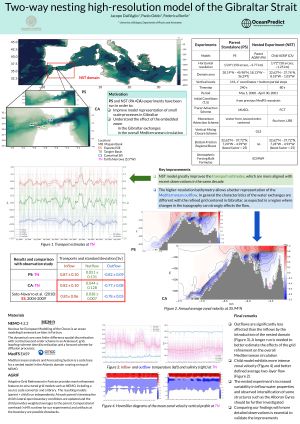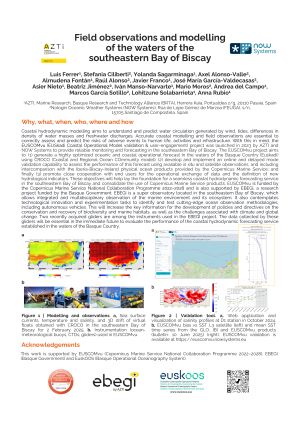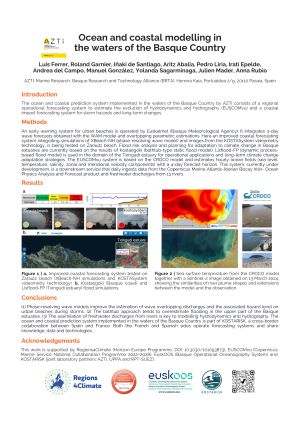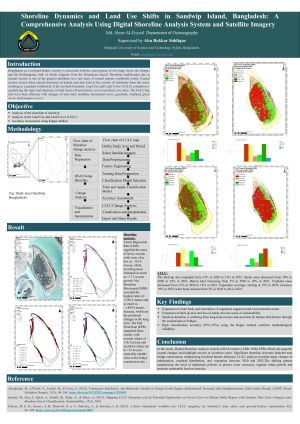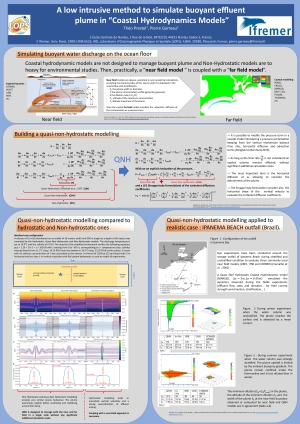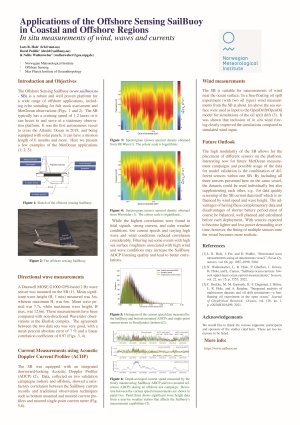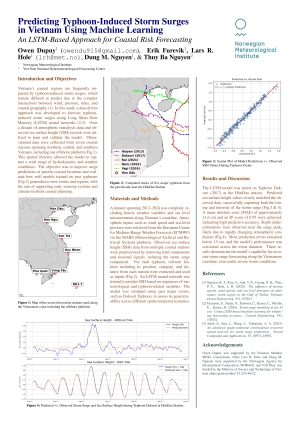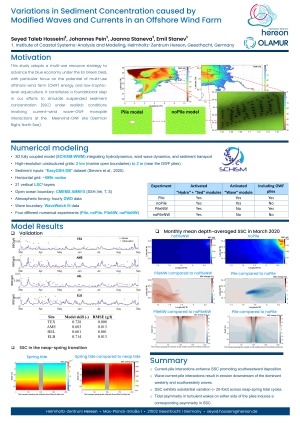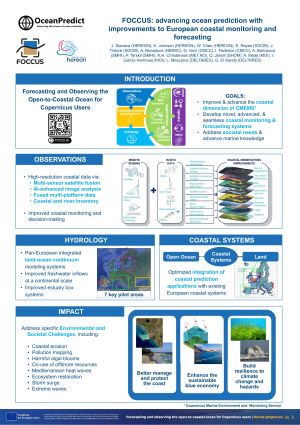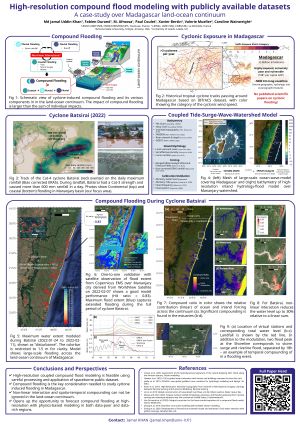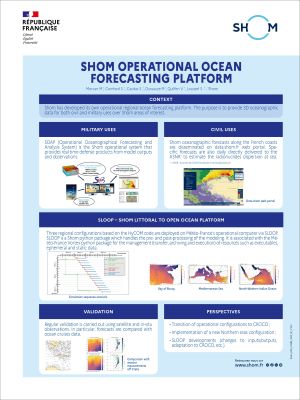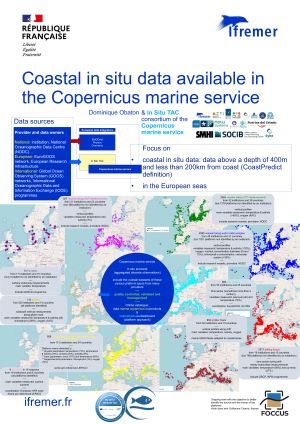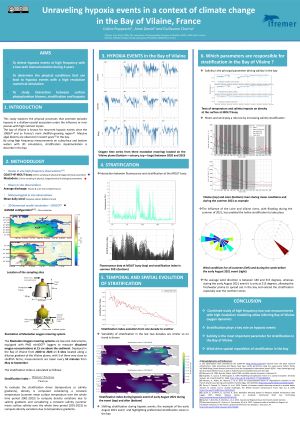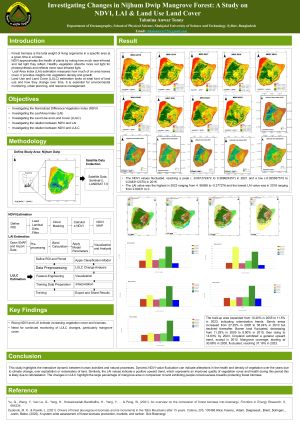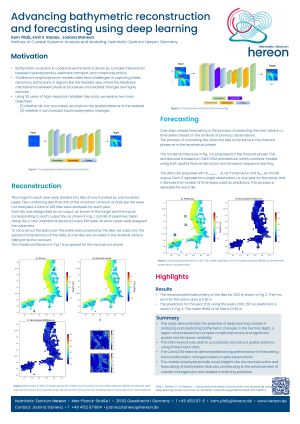COSS-TT meeting – June 2025

Overview and meeting objectives
Coastal Ocean and Shelf Seas Task Team – International Coordination Meeting (COSS-TT ICM)
Ifremer, Brest-Plouzané, France
17-20 June 2025
The main goal and central mission of the COSS-TT is international coordination in support of new science and expertise leading to improvements in coastal ocean prediction and forecast systems. COSS-TT works within OceanPredict towards the provision of a sound scientific and expert basis for sustainable multidisciplinary downscaling and forecasting activities in the world’s regional and coastal oceans. The strategic goal of the COSS-TT is to help achieve a truly seamless framework from the global to the coastal/littoral scale. A major contribution is to address the particular challenges on monitoring and forecasting in coastal areas and regional seas, where the majority of human marine activities take place. As these are also the areas of enhanced exploitation of marine resources, the COSS-TT has a mission well aligned with society’s needs and benefits.
International coordination meetings of the OceanPredict Coastal Ocean and Shelf Seas Task Team (COSS-TT) gather a broad community of scientists, engineers and experts around presentations and discussion themes in support of coastal ocean forecasting. The COSS-TT is well-aligned with relevant international initiatives under the UN Ocean Decade, such as the CoastPredict program, the SynObs project, the Decadal Collaborative Center for Ocean Prediction and the Decadal Collaborative Center for Coastal Resilience.
Important dates
| June 2024 | Save the date announcement |
| September 2024 | Announcement of WS with flyer. |
| 21 January 2025 | Opening of Call for abstracts |
| 11 March 2025 | Opening of registration |
| 14 March 2025 | Abstract submission closes |
| 1 April 2025 | Registration deadline |
| 17-20 June 2025 | Meeting |
Date and Time
The COSS-TT meeting will be organised on June 2025 within the week of 17-20 June 2025 (tentative dates). It will be hosted by Ifremer, Plouzané, near Brest, France.
Registration and abstract submission
Please note that everyone who is planning to attend the COSS-TT meeting must register using the link below.
If you like to submit an abstract you have to use the abstract submission form in addition.
| REGISTRATION
NOW CLOSED (deadline extended to 15 April 2025) Meeting registration will be organized by Ifremer as it includes the collection of secure information (see below). Contact (registration) In case of questions about the registration please contact our Ifremer host. Security information on entering the venue Entering Ifremer premises requires all participants to be security checked. Therefore, the registration includes a secure upload link to collect your passport information. This information will be handled by Ifremer confidentially and securely and not shared with a third parties. Costs The event will be free of charge. A workshop dinner will be sponsored by Ifremer. |
ABSTRACT SUBMISSION
NOW CLOSED You can upload a maximum of 2 abstract. The abstract should be provided as a .doc or .docx file, be no longer than one page and should ideally not include a graphic. Please view template here. Abstracts should be matched to one or more of the workshop themes. Please view themes here. |
Meeting Format
The workshop will take place over 4 days starting on Tue afternoon (17 June 2025) and closing on Fri lunch time (20 June 2025). It will be hosted by Ifremer at Plouzané, near Brest, France.
The meeting will be an in-person meeting. Streaming is being considered. We expect about 50-80 participants.
Presentations
The meeting will consist of oral and poster presentations selected through the abstract submission process and organized by the meeting themes.
- Length of talks and Q&A to be confirmed.
- We expect to record presentations and put them on the website after the meeting and will ask permission for online display via the abstract submission form.
- We are planning to open the COSS-TT 2025 Special Issue in Ocean Dynamics after the meeting.
Abstracts
All submitted abstracts are available in the table below in pdf format (some exceptions).
Sorted alphabetically by author.
Agenda
The meeting agenda is now available.
| Detailed agenda organised by day (showing all oral presenters) | |||
|---|---|---|---|
| Tue, 17 June 025 | Wed, 18 June 2025 | Thu, 19 June 2025 | Fri, 20 June 2025 |
Agenda Overview (click on image):
Themes
The themes covered by this meeting are listed below.
When submitting an abstract please match it to one or more of these themes. The registration and abstract submission form will provide for this.
- The observing infrastructure in the coastal seas, its integration with ocean model, prediction and forecast systems
- Ocean modelling at the regional and shelf sea spatial scales and seamless integration with larger-scale estimates
- The land-ocean continuum: integration of models for coastal ocean and estuaries/deltas/wetlands, including effects on urban built environments/coastal cities
- Coastal projections and scenarios, coastal vulnerability, wave and storm surge impacts in the coastal zone
- AI/ML applications in the coastal ocean prediction
- User applications and decision tools in the coastal ocean (including Digital Twins)
- The role of the COSS-TT in the UN Ocean Decade and beyond
Posters
To view a poster and/or contact the author(s) we will provide more information in due course. When uploaded you will be able to view the poster, the abstract and contact the authors by email.
At event poster should be displayed using A0 size and portrait format / orientation.
Please find below the posters to view.
Click on the “Abstract title” link in the table and you will be able to view the poster details including the poster pdf, author, abstract and author contact (email).
Please direct any questions or comments to the author via the given email.
ID: 1
Numerical assessment of tidal potential energy in the Brazilian Equatorial Shelf
Authors: Alessandro L. Aguiara,b,c,j, Martinho Marta-Almeidag,h, Mauro Ciranoi,j, Janini Pereirad,f,j, Letícia Cotrim da Cunhab,c,e
Affiliation:
a Departamento de Oceanografia Física e Meteorologia, Faculdade de Oceanografia, Universidade do Estado do Rio de Janeiro, Rio de Janeiro, Brazil
b Programa de Pós-graduação em Oceanografia, Faculdade de Oceanografia, Universidade do Estado do Rio de Janeiro, Rio de Janeiro, Brazil
c Rede Clima, Sub-rede Oceanos, Instituto Nacional de Pesquisas Espaciais, São José dos Campos, Brazil
d Programa de Pós-graduação em Geofísica, Instituto de Geociências, Universidade Federal da Bahia, Salvador, Brazil
e Rede Brasileira de Pesquisa em Acidificação dos Oceanos (BrOA), Universidade Federal de Rio Grande, Rio Grande, Brazil
f Departamento de Física da Terra e do Meio Ambiente, Instituto de Física, Universidade Federal da Bahia, Salvador, Brazil
g Centro Oceanográfico de A Coruña, Instituto Español de Oceanografia, A Coruña, Spain
h Centro Interdisciplinar de Investigação Marinha e Ambiental, Universidade do Porto, Portugal
i Departamento de Meteorologia, Instituto de Geociências, Universidade Federal do Rio de Janeiro, Rio de Janeiro, Brazil
j Rede de Modelagem e Observação Oceanográfica (REMO), Brazil
Abstract: Please click here
Contact the author by email: Alessandro Aguiar
ID: 2
An Operational Daily Current Bulletin of Santos and Campos Basins
Authors: Fernando Mattos1,2, Paula de Padua1, Breno S. Cabral1,2, Patrícia Baldasso1, Bruna Faria1, Mariana Ximenes1, Lucas Tartaro Pereira1,3, Pedro Calixto1
Affiliation:
1 OCEANOP/PETROBRAS
2 Laboratory of Physical Oceanography – LOF/COPPE, Oceanic Engineering Program, Federal University of Rio de Janeiro, Rio de Janeiro, Brazil
3 Laboratory of Mesoscale Meteorology, Institute of Astronomy, Geophysics and Atmospheric Sciences, University of São Paulo, São Paulo, Brazil
Abstract: Please click here
Contact the author by email: Breno Cabral
ID: 3
MARC – Modeling and Analysis for Coastal Research
Authors: Jean-François Le Roux1, Mickaël Accensi1, Sébastien Petton2, Emmanuelle Autret1, Fabrice Ardhuin1, Valérie Garnier1, Morgan Dussauze3, Pierre Garreau1, Matthieu Caillaud4, Lucia Pineau-Guillou1, Franck Dumas3, Pascal Lazure1, Sébastien Theetten1, Guillaume Charria1
Affiliation:
1 Ifremer, Univ. Brest, CNRS, IRD, Laboratoire d’Océanographie Physique et Spatiale (LOPS), IUEM, 29280 Brest, France
2 Ifremer, LEMAR UMR 6539 CNRS/UBO/IRD/Ifremer, 29280 Plouzané, France
3 Shom, 29200 Brest, France
4 Ifremer, DYNECO, Hydrosedimentary Dynamics Laboratory (DHYSED), 29280 Brest, France
Abstract: Please click here
Contact the author by email: Jean Francois Le Roux
ID: 4
Effects of heatwave events on dissolved oxygen in the Elbe Estuary
Authors: Heshan Fan1,2, Johannes Pein1, Wei Chen1*, Joanna Staneva1, Heqin Cheng2*
Affiliation:
1 Institute of Coastal Systems-Analysis and Modeling, Helmholtz-Zentrum Hereon, Geesthacht, Germany
2 State Key Laboratory of Estuarine and Coastal Research, East China Normal University, Shanghai, China
Abstract: Please click here
Contact the author by email: Wei Chen
ID: 5
A Comparative Analysis of Ocean Reanalysis in the South Atlantic
Authors: Paula Marangoni Gazineu Marinho Pinto1,2, Mauro Cirano1, Afonso de Moraes Paiva2
Affiliation:
1 Laboratory of Physical Oceanography, Department of Meteorology, Institute of Geosciences, Federal University of Rio de Janeiro, Rio de Janeiro, Brazil
2 Physical Oceanography Laboratory – LOF/COPPE, Oceanic Engineering Program, Federal University of Rio de Janeiro, Rio de Janeiro, Brazil
Abstract: Please click here
Contact the author by email: Mauro Cirano
ID: 6
In situ Observations of the Spatiotemporal Variability of Hydrodynamics on the Amazon Continental Shelf
Authors: Pedro Paulo de Freitas1*; Mauro Cirano3; Carlos Eduardo Peres Teixeira4; Sávio Jeliel Roque Melres2; Antony Kadu Carvalho dos Santos de Sousa2; Vando Costa Gomes2; Camilo Andrés GuerreroMartin2; Ariane Koch-Larrouy5
Affiliation:
1 Center for Marine Studies, Federal University of Paraná (UFPR), Brazil; * [email protected]
2 Faculty of Engineering, Federal University of Pará (UFPA), Brazil;
3 Institute of Geosciences, Federal University of Rio de Janeiro (UFRJ), Brazil;
4 Labomar, Federal University of Ceará (UFC), Brazil;
5 Université de Toulouse, LEGOS (CNRS/IRD/UPS/CNES), France.
Abstract: Please click here
Contact the author by email: Mauro Cirano
ID: 7
Two-way nesting high-resolution model of the Gibraltar Strait
Authors: Jacopo Dall’Aglio, Paolo Oddo, Federica Borile
Affiliation: University of Bologna, Department of Physics and Astronomy
Abstract: Please click here
Contact the author by email: Jacopo Dall’Aglio
ID: 8
Field observations and modelling of the waters of the southeastern Bay of Biscay
Authors: Luis Ferrer1, Stefania Ciliberti2, Yolanda Sagarminaga1, Axel Alonso-Valle2, Almudena Fontán1, Raúl Alonso2, Javier Franco1, José María García-Valdecasas2, Asier Nieto1, Beatriz Jiménez2, Iván Manso-Narvarte1, Mario Moros2, Andrea del Campo1, Marcos García Sotillo2, Lohitzune Solabarrieta1, Anna Rubio1
Affiliation:
1 AZTI, Marine Research, Basque Research and Technology Alliance (BRTA), Herrera Kaia, Portualdea z/g, 20110 Pasaia, Spain
2 Nologin Oceanic Weather Systems (NOW Systems), Rúa de Lope Gómez de Marzoa (FEUGA), s/n, 15705 Santiago de Compostela, Spain
Abstract: Please click here
Contact the author by email: Luis Ferrrer
ID: 9
Ocean and coastal modelling in the waters of the Basque Country
Authors: Luis Ferrer, Roland Garnier, Iñaki de Santiago, Aritz Abalia, Pedro Liria, Irati Epelde, Andrea del Campo, Manuel González, Yolanda Sagarminaga, Julien Mader, Anna Rubio
Affiliation: AZTI, Marine Research, Basque Research and Technology Alliance (BRTA), Herrera Kaia, Portualdea z/g, 20110 Pasaia, Spain
Abstract: Please click here
Contact the author by email: Luis Ferrrer
ID: 10
Shoreline Dynamics and Land Use Shifts in Sandwip Island, Bangladesh: A Comprehensive Analysis Using Digital Shoreline Analysis System and Satellite Imagery
Authors: Md. Abrar-Al-Foysol
Affiliation: Shahjalal University of Science and Technology. Sylhet, Bangladesh.
Abstract: Please click here
Contact the author by email: Abrar-Al-Foysol

ID: 11
The dynamics off Toulon explored from various datasets
Authors: V. Garnier1, A. Ponte1, M. Demol1, P. Garreau1, C. Estournel2 and J. Beuvier3
Affiliation:
1Ifremer, LOPS
2 LEGOS
3 CNRM
Abstract: Please click here
Contact the author by email: Valérie Garnier
ID: 12
A low intrusive method to simulate buoyant effluent plume in “Coastal Hydrodynamics Models”
Authors: Théo Prestel1, Pierre Garreau2
Affiliation:
1 École Centrale de Nantes, 1 Rue de la Noë, BP 92101 44321 Nantes Cedex 3, France
2 Ifremer, Univ. Brest, CNRS UMR 6523, IRD, Laboratoire d’Océanographie Physique et SpaVale (LOPS), IUEM, 29280, Plouzané, France; [email protected]
Abstract: Please click here
Contact the author by email: Pierre Garreau





ID: 13
Regular triangle approximation for reduced-order Kalman filter
Authors: Naoki HIROSE1, Satoshi YAMASHITA2, Toru SAMESHIMA3, Katsumi TAKAYAMA3
Affiliation:
1Research Institute for Applied Mechanics, Kyushu University
2Interdisciplinary Graduate School of Engineering Sciences, Kyushu University
3Institute of Environmental Informatics, IDEA Consultants, Inc
Abstract: Please click here
Contact the author by email: Naoki Hirose
ID: 14
Applications of the Offshore Sensing SailBuoy in Coastal and Offshore Regions
Authors: Lars R. Hole1 ([email protected]), David Peddie2 ([email protected]) & Nellie Wullenweber3 ([email protected])
Affiliation:
1 Norwegian Meteorological Institute
2 Offshore Sensing
3 Max Planck Institute of Geoanthropology
Abstract: Please click here
Contact the author by email: Lars Hole
ID: 15
Predicting Typhoon-Induced Storm Surges in Vietnam Using Machine Learning
Authors: Owen Dupuy1 ([email protected]), Erik Furevik1, Lars R. Hole1 ([email protected]), Dung M. Nguyen1, & Thuy Ba Nguyen2
Affiliation:
1 Norwegian Meteorological Institute
2 Vietnam National Hydrometeorological Forecasting Center
Abstract: Please click here
Contact the author by email: Lars Hole
ID: 16
Variations in Sediment Concentration caused by Modified Waves and Currents in an Offshore Wind Farm
Authors: Seyed Taleb Hosseini¹, Johannes Pein¹, Joanna Staneva¹, Emil Stanev¹
Affiliation:
1Institute of Coastal Systems-Analysis and Modeling, Helmholtz-Zentrum Hereon, Geesthacht, Germany
Abstract: Please click here
Contact the author by email: Seyed Taleb Hosseini
ID: 17
FOCCUS: advancing ocean prediction with improvements to European coastal monitoring and forecasting
Authors: J. Staneva1, K. Johnson1, W. Chen1, E. Reyes2, J.Tintoré2, A. Bonaduce3, G. Verri4, I. Federico4, A. Bartosova5, P. Terskii5, K.H. Christensen6, Q. Jamet7, A. Melet8, I.
Garcia Hermosa8, L. Meszaros9, G. El Serafy9
Affiliation:
1Institute of Coastal Systems-Analysis and Modeling, Helmholtz-Zentrum Hereon, Geesthacht, Germany
2 SOCIB
3 NERSC
4 CMCC
5 SMHI
6 Met.No
7 SHOM
8 MOi
9 Deltares
Abstract: Please click here
Contact the author by email: Kelli Johnson
ID: 18
High-resolution compound flood modeling with publicly available datasets
Authors: Md Jamal Uddin Khan1, Fabien Durand1, M. Afroosa1, Paul Coulet1, Xavier Bertin2, Valerie Mueller3, Caroline Wainwright4
Affiliation:
1 LEGOS UMR 5566, CNRS/CNRS/IRD/UPS, Toulouse, France
2 LIENSs, UMR 7266, CNRS/LRU, La Rochelle, France
3 Arizona State University, Tempe, Arizona, USA
4 University of Leeds, Leeds, UK
Abstract: Please click here
Contact the author by email: Hyun-Chul Lee





ID: 19
Improvements in the US West Coast Ocean Forecast System (WCOFS)
Authors: Alexander Kurapov
Affiliation: NOAA
Abstract: Please click here
Contact the author by email: Alexander Kurapov
ID: 20
SHOM OPERATIONAL OCEAN FORECASTING PLATFORM
Authors: Morvan M.1, Corréard S .1, Casitas S .1, Dussauze M.1, Quilfen V. 1and Louazel S. 1
Affiliation:
1 Shom
Abstract: Please click here
Contact the author by email: Stéphanie Louazel
ID: 21
Coastal in situ data available in the Copernicus marine service
Authors: Dominique Obaton1 and the In Situ TAC consortium2
Affiliation:
1 Ifremer –In Situ TAC coordination
2 In Situ TAC partners: Ifremer, IMR, SMHI, BSH, Puertos del Estado, NOW systems, HCMR, IO-BAS, CLS, Oceanscope, ULR, Pokapok, CNR, SOCIB, AZTI, SYKE
Abstract: Please click here
Contact the author by email: Dominique Obaton
ID: 22
Unravelling hypoxia events in a context of climate change in the Bay of Vilaine, France
Authors: Coline Poppeschi1, Anne Daniel2, Guillaume Charria1
Affiliation:
1 Ifremer, Univ. Brest, CNRS, IRD, Laboratory for Ocean Physics and Satellite remote sensing (LOPS), IUEM, 29280 Brest, France.
2 Ifremer, DYNECO, Pelagic Ecology Laboratory (PELAGOS), 29280 Brest, France.
Abstract: Please click here
Contact the author by email: Guillaume Charria (for Coline Poppeschi)
ID: 23
Investigating Changes in Nijhum Dwip Mangrove Forest: A Study on NDVI, LAI & Land Use Land Cover
Authors: Tahmina Anwar Tonny
Affiliation: Shahjalal University of Science & Technology
Abstract: Please click here
Contact the author by email: Tahmina Anwar Tonny





ID: 24
Physical-Biogeochemical Coupling Mechanisms of Deoxygenation Events in the East China Sea
Authors: Xiaoping Xu1 and Huijie Xue1,2
Affiliation:
1 Department of Physical Oceanography, College of Ocean and Earth Sciences, Xiamen
University, China
2 State Key Laboratory of Marine Environmental Sciences (Xiamen University), China
Abstract: Please click here
Contact the author by email: Huijie Xue
ID: 25
Advancing bathymetric reconstruction and forecasting using deep learning
Authors: Irem Yildiz1, Emil V. Stanev1, 2, Joanna Staneva1
Affiliation:
1 Institute of Coastal Systems – Analysis and Modeling, Helmholtz-Zentrum Hereon, Geesthacht, Germany
2 Department of Meteorology and Geophysics, University of Sofia “St. Kliment Ohridski”, Sofia, Bulgaria
Abstract: Please click here
Contact the author by email: Irem Yildiz
Remote access
Zoom meeting links to connect to the presentations of the COSS-TT meeting for all 4 meeting days:
You may have received an email with the detailed information.
Please contact [email protected] for any questions
Venue
The COSS-TT meeting will take place from 17-20 June 2025 at
Ifremer, 1625 Rte de Sainte-Anne, 29280 Plouzané (near Brest), France
Attendees
As in previous events, COSS community members, attendees of previous COSS-TT events, any interested members of the international regional/coastal ocean monitoring and forecasting communities and particularly local and early career scientists and researchers are very welcome to attend and submit an abstract. COSS Task Team members or their substitutes are expressly invited to attend.
Accommodation and local information
Hotel bookings should be made in good time before the meeting as another large event is happening in Brest at the same time.
Ifremer may be reached from Brest city center using public transportation or taxi.
Details can be found here.
Organising Committee
Local hosts and organizers
Local hosts: (contacts for practical meeting organization questions)
- Guillaume Charria, guillaume.charria_at ifremer.fr
- Audrey Mallejac (Ifremer, France)
COSS-TT co-chairs: (contacts for scientific/agenda-related questions)
- Pierre De Mey Frémaux, pierre.de-mey_at_cnrs.fr
- Villy Kourafalou, vkourafalou_at_rsmas.miami.edu
- Alexander Kurapov, alexander.kurapov_at_noaa.gov
- Joanna Staneva, joanna.staneva_at_hereon.de
GOV programme office : (contact for website-related questions)
- Kirsten Wilmer-Becker, kirsten.wilmer-becker_at_metoffice.gov.uk
- Stéphanie Cuven, scuven_at_mercator-ocean.fr

